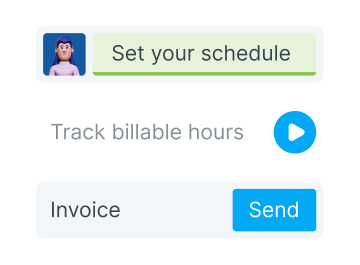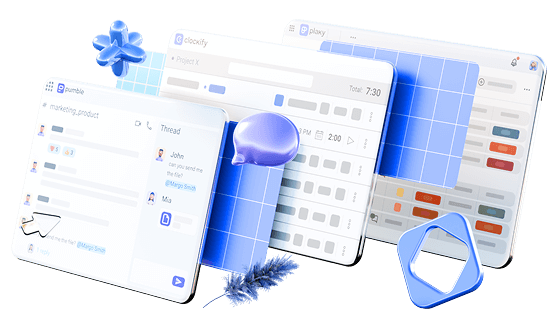From the punch clock to AI-powered apps, time tracking tools have come a long way.
Time tracking software has many upsides, such as better organization and prioritization of work, increased productivity, and healthier work-life balance. AI adds additional benefits, like analyzing potential productivity drops and burnout, as well as better shift scheduling.
However, AI-powered time trackers also raise significant concerns, particularly regarding data privacy and psychological safety at work. We talked with experts to investigate the matter, and learned that AI time trackers can be helpful, but require human fact-checking and monitoring.
- AI-powered tools gather massive amounts of employee data, raising data privacy issues.
- AI time tracking tools might lead to employees’ disengagement and erode their trust in managers and companies.
- AI time tracking tools may have reliability issues as they cannot track tasks that are not performed on a computer, like taking notes or having in-person meetings.
AI may come with data privacy concerns
To track work hours on behalf of employees, AI typically collects employee data, such as internet browsing, mouse or keyboard activity, and communication logs. Some AI-generated time trackers even use facial recognition, thus collecting biometric data. From the gathered data, AI makes conclusions about employees’ job-related activities. Overall, such monitoring can be intrusive. Time trackers that don’t use AI apply different approaches compared to AI-powered tools.
Now, to track employee time automatically, AI first needs data sets (sources) for its training. Vice President of Engineering at Clockify, Ljubomir Simin, highlights sources used for AI training as a potential threat:

“Non-AI time tracking tools like Clockify are usually less intrusive, can be manually set by both employees and employers, and they store data on internal servers, in compliance with the Code of Conduct and other legal regulations. On the other hand, AI-powered tools need data sets to be trained before commercial launch. The origin of that data raises moral concerns, as the data is either gathered from customers or employees, bought, or found in external open sources, potentially leading to legal issues.”
Doubts about AI are largely present in the US population. For instance, Heartland Forward research shows that 89% of respondents believe AI can’t safeguard privacy.
Similarly, Gallup found that “77% of adults do not trust businesses much (44%) or at all (33%) to use AI responsibly”. Moreover, almost 7 in 10 respondents who are extremely knowledgeable about AI do not trust businesses to use AI in a responsible manner.
AI may potentially have reliability issues
While time tracking software can demonstrate how much time an employee spends on each task, AI can’t track every aspect of an average workday, says GPTZero CEO Edward Tian:

“An AI tracking tool doesn’t know if employees are taking notes on paper, or if they are having an in-person meeting with a coworker, brainstorming. So, even if employees are actively being productive, AI tracking tools can’t always know that, and in turn, those times will be noted as the person not being productive at all.”
Furthermore, as computer scientist Jennifer Golbeck explained in her TEDx Talk, AI tends to hallucinate, which is “a great technical term for the fact that AI just makes stuff up a lot of the time”.
So, can we rely on AI time trackers for tracking employee productivity? In some ways, yes. AI time tracking tools can help managers collect and analyze data about employees’ productivity. However, AI cannot identify every task employees do, and due to reliability issues, AI-generated reports require fact-checking. Therefore, human judgment remains crucial.
AI time trackers can erode employees’ trust and wellbeing
All our experts agree that AI-powered time trackers can foster a culture of distrust and burnout if not handled carefully.
“The underlying implication of using monitoring software is that management doesn’t trust staff to perform their roles to the best of their abilities, or even worse, that they suspect them of acting dishonestly,” says Wendy Makinson, HR Manager at Joloda Hydraroll.
Aside from distrust, another possible issue is workplace anxiety, says National Executive Director of Mission Connection Healthcare, Ashley Peña. She also warns about managers overrelying on data, explaining that “human context matters, and AI tools sometimes fail to account for that.”
Moreover, clinical psychologist Dr Nicole Issa claims employees can’t precisely know what AI is tracking:

“They might feel they need to be on their guard when doing anything that isn’t work, like taking their break, making a coffee, time away from their desk, what time they get to work and leave.”
We also talked with Edel Holliday-Quinn, organizational psychologist and founder of the Centre for Leadership Psychology. Holliday-Quinn highlights that the “feeling of being constantly observed can increase stress and diminish psychological safety, leading to disengagement”.
She adds that research has shown surveillance can lead to stress and a sense of alienation, “with some employees even altering their behavior to appear more productive rather than being genuinely engaged in their work.” To avoid these issues, she advises organizations to use AI tools “as helpful resources rather than intrusive enforcers”.
Our final verdict: AI-powered time trackers still require human fact-checking
The vast majority of leading economies, companies, and experts agree that AI is the future. Recently published EY research demonstrates that business leaders will continue with significant AI spending in 2025, as 34% of companies currently investing in AI “plan to invest $10 million or more next year”.
If your company plans to introduce a time tracker, consider what type of tool works best for your needs and discuss it with employees. If you choose an AI-powered time tracker, try to address all their concerns. As Peña concludes, it’s all about fairness:

“When used thoughtfully, AI can improve processes, but employees need to feel valued as people, not just productivity stats.”
If you’d like to learn more about how to track employee time while respecting their privacy, check out our guide on how to track employee time without invading privacy.
How we reviewed this post: Our writers & editors monitor the posts and update them when new information becomes available, to keep them fresh and relevant.




